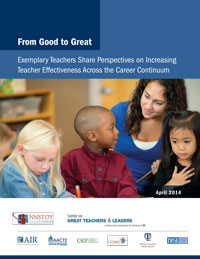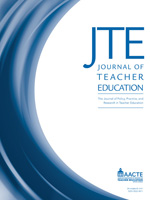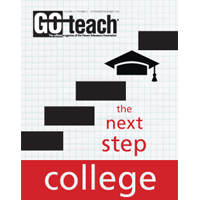10 Jun2014
By Elizabeth Ross
The Innovations Inventory of AACTE’s Innovation Exchange is an online database highlighting members’ pioneering practices in educator preparation that have shown a positive impact on issues of student learning, preparation program advancement, or educator workforce needs. This blog post is one in a series highlighting entries from the inventory. To request inclusion of your institution’s innovations, contact Zachary VanHouten at zvanhouten@aacte.org.
 Georgia State University (GSU) is the largest producer of minority educators in the state of Georgia and graduates approximately 500 teachers annually. GSU’s Network for Enhancing Teacher Quality (NET-Q) program aims to increase teacher quality in urban and rural areas in Georgia. The program includes both pre- and postbaccalaureate initiatives for educators serving high-need school districts in these settings.
Georgia State University (GSU) is the largest producer of minority educators in the state of Georgia and graduates approximately 500 teachers annually. GSU’s Network for Enhancing Teacher Quality (NET-Q) program aims to increase teacher quality in urban and rural areas in Georgia. The program includes both pre- and postbaccalaureate initiatives for educators serving high-need school districts in these settings.
NET-Q boasts a partnership with at least 15 rural PK-12 schools, local businesses, two historically Black colleges, and the National Commission on Teaching and America’s Future.
02 May2014
By Mary Harrill
 AACTE applauds the Council of Chief State School Officers’ 2014 National Teacher of the Year Sean McComb, the three additional finalists, and the colleges of education that helped prepare all of them for their highly successful careers.
AACTE applauds the Council of Chief State School Officers’ 2014 National Teacher of the Year Sean McComb, the three additional finalists, and the colleges of education that helped prepare all of them for their highly successful careers.
McComb, who is also the 2014 Maryland Teacher of the Year, teaches English at Patapsco High School & Center for the Arts in Baltimore. Additionally, he oversees the school’s Advancement via Individual Determination (AVID) program. He completed his undergraduate and graduate preparation at the University of Pittsburgh, earning a bachelor’s degree English literature and master’s degree in English education.
01 May2014
By Jessica Milton
 How does the profession support teachers’ development over time? Addressing that question from a collaborative approach, a new report was released yesterday by the National Network of State Teachers of the Year in partnership with the Center on Great Teachers and Leaders at American Institutes for Research and five other national education organizations, including AACTE. The Council of Chief State School Officers hosted a release event featuring a panel discussion by teacher leaders, researchers, and policy makers about the report’s findings.
How does the profession support teachers’ development over time? Addressing that question from a collaborative approach, a new report was released yesterday by the National Network of State Teachers of the Year in partnership with the Center on Great Teachers and Leaders at American Institutes for Research and five other national education organizations, including AACTE. The Council of Chief State School Officers hosted a release event featuring a panel discussion by teacher leaders, researchers, and policy makers about the report’s findings.
Insights in the report, From Good to Great: Exemplary Teachers Share Perspectives on Increasing Teacher Effectiveness Across the Career Continuum, are based on an exploratory survey of more than 300 former national and state teachers of the year. This research identifies valuable professional experiences and supports that were essential to these exemplar teachers’ professional growth and effectiveness throughout various stages of their career. Teachers responded to survey questions relevant to four stages of the teacher career continuum, identified as the preservice, novice, career, and teacher leader stages.
17 Apr2014
By Jane E. West
Tomorrow, April 18, is the deadline for public comment on the proposed “highly qualified teacher” (HQT) data collection by the U.S. Department of Education. A detailed letter submitted yesterday by the Coalition for Teaching Quality hails the proposed collection as “an important first step towards meeting the legislative intent” of Congress’ directive to report on the extent to which students in certain high-need categories are taught by teachers who are labeled as “highly qualified,” but who are actually teachers-in-training in alternative routes.
04 Feb2014
By Kristin McCabe
 The March/April 2014 issue of the Journal of Teacher Education (JTE) is now available online. See what Volume 65 Number 2 has to offer!
The March/April 2014 issue of the Journal of Teacher Education (JTE) is now available online. See what Volume 65 Number 2 has to offer!
- In this month’s editorial, “Research as a Catalyst for Change,” JTE‘s editors at Penn State University relate the issue’s contents to AACTE’s 66th Annual Meeting theme, Taking Charge of Change. Heralding the theme as an opportunity to champion the role of research in informing policy and practice, the editors highlight the articles’ contributions to knowledge about innovative practices in the development of both preservice and in-service educators.
30 Jan2014
By Sarah Pinsky
Today, AACTE released model state legislation to recruit high-achieving students into the teaching profession and incentivize them to teach in our neediest schools.
The Teaching Fellows bill is the first released by AACTE in its initiative to develop model state legislation that is aligned with AACTE’s state policy priorities and with the recommendations from “Excellent Teachers for Each and Every Child: A Guide for State Policy,” a joint effort by AACTE and several partner organizations that was released in December 2013. The initiative reflects AACTE’s goal of promoting sound education policies—grounded in research and practice—that will strengthen the teaching profession and will have a positive impact on students.
28 Jan2014
By Aimee Hall
This post also appears on the AACTE Annual Meeting site.
AACTE and TeachingWorks are collaborating on a strand of sessions at the 66th Annual Meeting that will examine the challenges of preparing novice teachers for practice and explore potential solutions. This strand will provide a forum for sharing ideas and learning from programs that are taking on the challenges of building practice-based teacher education. It will also address implications of the Common Core State Standards for teacher preparation.
17 Jan2014
By Deborah Schussler and Lisa Johnson
The authors are members of AACTE’s topical action group on Teacher Education as a Moral Community. The views expressed in this post do not necessarily reflect the views of AACTE.
A recent National Council on Teacher Quality (NCTQ) report evaluates teacher preparation programs for their attention to an important element of preparation: classroom management. Unfortunately, the report’s few helpful suggestions get lost in the slough of misguided assumptions and questionable claims by the report’s authors.
16 Dec2013
By Jessica Milton

The editors of Go Teach magazine recently turned to AACTE to help prospective teacher candidates navigate the proliferation of conflicting visions of what constitutes effective teacher preparation. In response, my colleague Saroja Barnes and I coauthored an article for the magazine that ran in the November/December issue as the cover story, “How to Choose an Effective Teacher Preparation Program.”
Based on relevant research on teacher preparation, the article points to several key components of high-quality programs that potential teacher candidates should consider. Structured by seven key questions, the article guides prospective candidates to think through the following issues when exploring teacher preparation pathways:
10 Dec2013
By Kristin McCabe

The January/February 2014 issue of the Journal of Teacher Education (JTE) is now available online. See what Volume 65 Number 1 has to offer—without waiting for the mail delivery!
- In this month’s editorial, JTE‘s editors at Penn State University announce the 2014 Editorial Review Board and outline the highlights of this issue’s articles.
- “The Effects of Teacher Entry Portals on Student Achievement” classifies North Carolina public school teachers into 11 predominant “portals” of entry into the profession and estimates their effects on students’ test score gains. The gains are generally higher for students of teachers prepared through in-state, public undergraduate programs—but Teach for America corps members seem to be more effective in STEM subjects and at the secondary level.
05 Dec2013
By Mary Harrill
On December 10, the National Council on Teacher Quality (NCTQ) will release a report on how well educator preparation programs prepare teachers to effectively manage classrooms. The report will include an analysis of 122 programs, judging them based on what NCTQ has identified as the five most important classroom management strategies:
- “Rules: Establish and teach classroom rules to communicate expectations for behavior.
- Routines: Build structure and establish routines to help guide students in a wide variety of situations.
- Praise: Reinforce positive behavior, using praise and other means.
- Misbehavior: Consistently impose consequences for misbehavior.
- Engagement: Foster and maintain student engagement by teaching interesting lessons that include opportunities for active student participation.”
AACTE has no further information about the report at this time, but we’ll keep you posted as we learn more. Information on past NCTQ reviews is available here.
02 Dec2013
By Lisa Johnson Kiefer

A groundbreaking policy guide released today provides state lawmakers and education advocates with a blueprint for practical changes to improve teaching quality in America. The guide recommends policies based on research and state models that have been highly effective in developing and sustaining talented and diverse teaching forces that prepare all students for college, career, and life.
25 Nov2013
By Sarah Pinsky
Last summer in its 2013 Teacher Prep Review, the National Council on Teacher Quality (NCTQ) set forth recommendations for state and local policy makers who want to see the ratings increase for educator preparation programs in their jurisdictions. One of these recommendations was to “revamp current inspections of teacher preparation programs, performed as a condition of program approval.” Positing that neither state program approval site visits nor national accreditor site visits have proven to be meaningful, NCTQ recommended that states employ independent inspectors, along the lines of the British inspectorate model for preparation programs, to conduct program evaluation site visits and program evaluations.
22 Nov2013
By Alicia Ardila-Rey
Good news: A new study shows that transferring highly effective teachers to low-performing elementary schools improves the achievement of students in those schools. The impact of the transferred teachers in this study was greater than the impact of Teach For America (TFA) teachers found in studies with similar student populations.
Mathematica conducted the multisite experimental study, in which highly effective teachers were offered $20,000 over 2 years to transfer into and remain in elementary and middle schools that had low average test scores.
21 Nov2013
By Sharon Robinson and Fayneese Miller
Note: This op-ed was submitted to The New York Times but was not published.
A recent column by Bill Keller in The New York Times, “An Industry of Mediocrity,” highlighted a 2005 report by the well-respected Arthur Levine that concluded that the programs that prepare our nation’s educators “range from inadequate to appalling” and set the premise that the profession is a “contended cartel” of low-quality programs that should “feel threatened.” As leaders of AACTE, we view Mr. Keller’s column not as a threat but as an opportunity to do what we do best: educate.
 Georgia State University (GSU) is the largest producer of minority educators in the state of Georgia and graduates approximately 500 teachers annually. GSU’s Network for Enhancing Teacher Quality (NET-Q) program aims to increase teacher quality in urban and rural areas in Georgia. The program includes both pre- and postbaccalaureate initiatives for educators serving high-need school districts in these settings.
Georgia State University (GSU) is the largest producer of minority educators in the state of Georgia and graduates approximately 500 teachers annually. GSU’s Network for Enhancing Teacher Quality (NET-Q) program aims to increase teacher quality in urban and rural areas in Georgia. The program includes both pre- and postbaccalaureate initiatives for educators serving high-need school districts in these settings.






 AACTE applauds the Council of Chief State School Officers’ 2014 National Teacher of the Year
AACTE applauds the Council of Chief State School Officers’ 2014 National Teacher of the Year  How does the profession support teachers’ development over time? Addressing that question from a collaborative approach, a new report was
How does the profession support teachers’ development over time? Addressing that question from a collaborative approach, a new report was  The March/April 2014 issue of the Journal of Teacher Education (JTE) is now available online. See what
The March/April 2014 issue of the Journal of Teacher Education (JTE) is now available online. See what 
